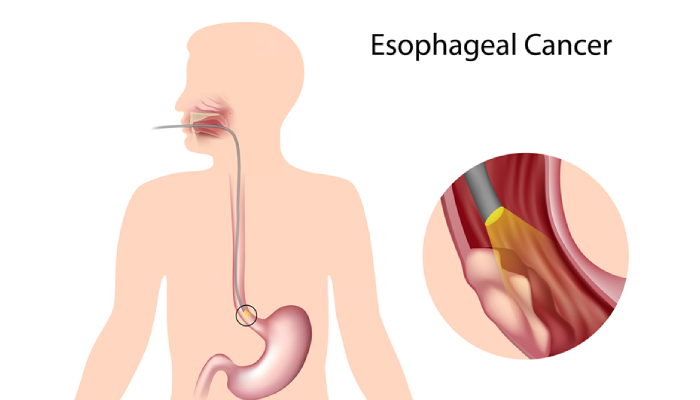Esophageal Cancer: Causes, Symptoms, and Treatment!
Esophageal cancer is a malignant condition that develops in the lining of the esophagus—a long, muscular tube responsible for transporting food from the throat to the stomach. This type of cancer can arise anywhere along the esophagus and is more commonly seen in men than women.
Early symptoms of esophageal cancer may include difficulty swallowing (dysphagia), unintentional weight loss, chest pain, persistent heartburn, or chronic cough. Risk factors include smoking, excessive alcohol consumption, chronic acid reflux (GERD), and Barrett’s esophagus.
Early diagnosis and treatment are crucial. Treatment options may involve surgery, chemotherapy, radiation therapy, or targeted therapy, depending on the stage and type of cancer.
For expert diagnosis and treatment, consult Dr. Ujwal Zambare, the leading Gastroenterologist and GI Surgeon in Wakad, PCMC, Pune.

Risk Factors
It’s thought that chronic irritation of your esophagus may contribute to the changes that cause esophageal cancer. Factors that cause irritation in the cells of your esophagus and increase your risk of esophageal cancer include:
- Having gastroesophageal reflux disease (GERD)
- Smoking
- Having precancerous changes in the cells of the esophagus (Barrett’s esophagus)
- Being obese
- Drinking alcohol
- Having bile reflux
- Having a steady habit of drinking very hot liquids
Symptoms
- Difficulty swallowing (dysphagia)
- Weight loss without trying
- Chest pain, pressure or burning
- Worsening indigestion or heartburn
- Coughing or hoarseness
How Is Esophageal Cancer Treated?
As with many cancers, esophageal cancer treatment has a greater chance of success if the cancer is caught early. Unfortunately, by the time esophageal cancer is diagnosed for many people, it is often already in an advanced stage (has spread throughout the esophagus and beyond).
Treatment of esophageal cancer depends on many factors, including the stage of the cancer and the overall health of the patient.
- Surgery. Part or all of the esophagus may be removed.
- Radiation therapy. Kills cancer cells with radiation.
- Chemotherapy. Powerful drugs that attack cancer cells throughout the body; typically used in combination with radiation therapy and/or surgery.
- Targeted therapy. Newer treatments that target specific aspects of a cancer to curb cancer growth and spread.
- Immunotherapy. Helps the immune system to attack cancer cells.
- Photodynamic therapy. Targets cancer cells with a special laser light.
Prevention
- Quit smoking. If you smoke, talk to your doctor about strategies for quitting. Medications and counseling are available to help you quit. If you don’t use tobacco, don’t start.
- Drink alcohol in moderation, if at all. If you choose to drink alcohol, do so in moderation. For healthy adults, that means up to one drink a day for women and up to two drinks a day for men.
- Eat more fruits and vegetables. Add a variety of colorful fruits and vegetables to your diet.
- Maintain a healthy weight. If you are overweight or obese, talk to your doctor about strategies to help you lose weight. Aim for a slow and steady weight loss of 1 or 2 pounds a week.
Expert Esophageal Cancer Care in Wakad, Pune
If you are experiencing symptoms of esophageal cancer or have concerns about your digestive health, don’t delay seeking expert medical advice. Dr. Ujwal Zambare at True Life Clinic & Wellness Center provides comprehensive care, from early diagnosis to advanced treatment options.
